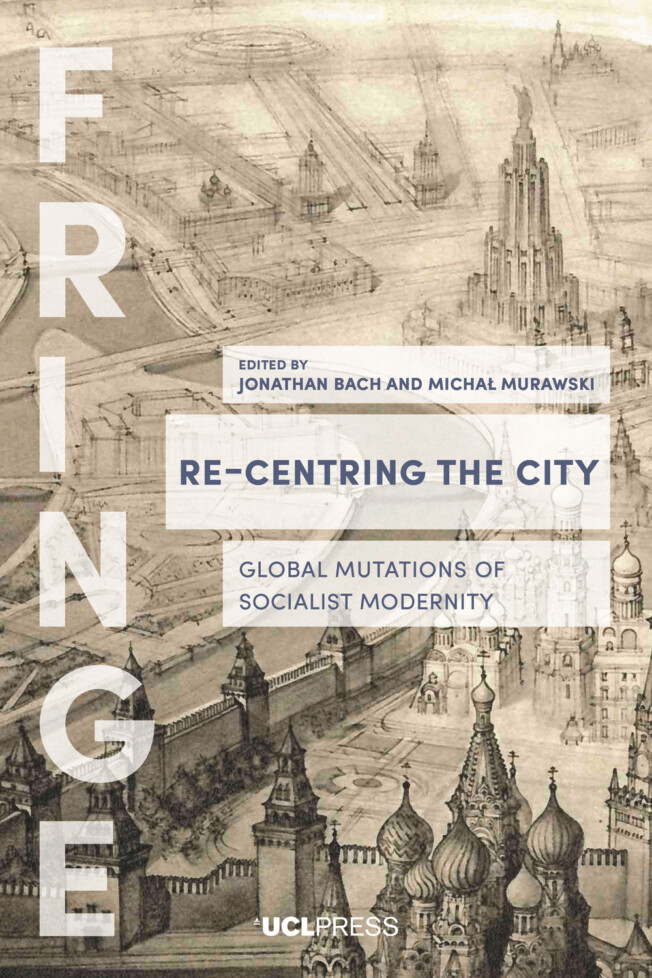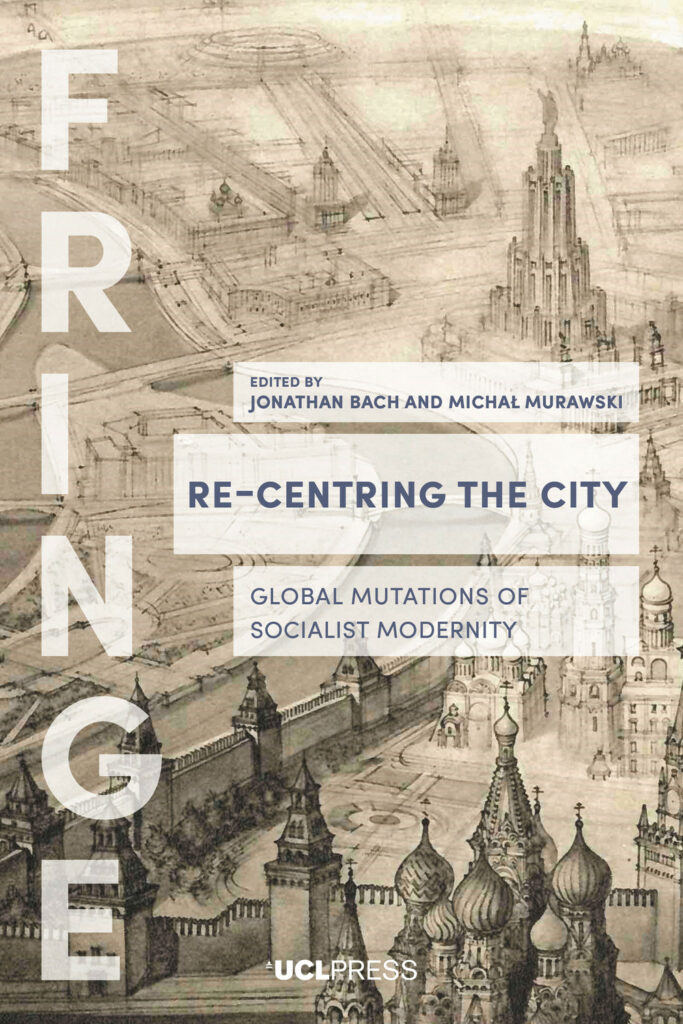
Re-Centring the City
Global Mutations of Socialist Modernity
Jonathan Bach (Editor), Michał Murawski (Editor)
Series: FRINGE
What is the role of monumentality, verticality and centrality in the twenty-first century? Are palaces, skyscrapers and grand urban ensembles obsolete relics of twentieth-century modernity, inexorably giving way to a more humble and sustainable de-centred urban age? Or do the aesthetics and politics of pomp and grandiosity rather linger and even prosper in the cities of today and tomorrow?
Re-Centring the City zooms in on these questions, taking as its point of departure the experience of Eurasian socialist cities, where twentieth-century high modernity arguably saw its most radical and furthest-reaching realization. It frames the experience of global high modernity (and its unravelling) through the eyes of the socialist city, rather than the other way around: instead of explaining Warsaw or Moscow through the prism of Paris or New York, it refracts London, Mexico City and Chennai through the lens of Kyiv, Simferopol and the former Polish shtetls. This transdisciplinary volume re-centres the experiences of the ‘Global East’, and thereby our understanding of world urbanism, by shedding light on some of the still-extant (and often disavowed) forms of ‘zombie’ centrality, hierarchy and violence that pervade and shape our contemporary urban experience.
Preface
Alena Ledeneva and Peter Zusi
Introduction: Notes towards a political morphology of undead urban forms
Jonathan Bach and Michał Murawski
Part I. Moscow, point of departure
1. Centre and periphery: a personal journey
Vladimir Paperny
2. Fortress city: the hegemony of the Moscow Kremlin and the consequences and challenges of developing a modern city around a medieval walled fortress
Clementine Cecil
3. Appropriating Stalinist heritage: state rhetoric and urban transformation in the repurposing of VDNKh
Andreas Schönle
4. The city without a centre: disurbanism and communism revisited
Owen Hatherley
5. Mutant centralities: Moscow architecture in the post-Soviet era
Dasha Paramonova
II. Off centre: palatial peripheries
6. Berlin’s empty centre: a double take
Jonathan Bach
7. Phantom palaces: Prussian centralities, and Humboldtian spectres
Khadija von Zinnenburg Carroll and Jonas Tinius
8. Palatial socialism, or (still-)socialist centrality in Warsaw
Michał Murawski
Part III. Looking inward: re-centring the sacred
9. The Architecture of the Seventh Day: building the sacred in socialist Poland
Kuba Snopek with Izabela Cichońska and Karolina Popera
10. Post-shtetl: spectral transformations and architectural challenges in the periphery’s bloodstream
Natalia Romik
11. Eat, pray, shop! The mosque as centrum in the Swedish suburbs
Jennifer Mack
Part IV. Looking upward: power verticals
12. Verticality and centrality: the politics of contemporary skyscrapers
Steve Graham
13. Partitioning earth and sky: vertical urbanism in post-socialist Mumbai
Vyjayanthi Venuturupalli Rao
14. Vertical horizons: the shadow of The Shard
Thomas Wolseley
Part V. Looking outward: hinterlands, diffusions, explosions
15. New geographies of hinterland
Pushpa Arabindoo
16. De-escalating the centre: urban futures and special economic zones beyond poststructuralism’s neoliberal imaginations
Patrick Neveling
17. Explosion, response, aftermath
Joy Gerrard
Part VI. Things fall: (after)lives of monumentality
18. Domestic monumentality: scales of relationship in the modern city
Adam Kaasa
19. On an alleged thought of inflicting harm on a Lenin statue
Oleksiy Radynski
20. We’re losing him! On monuments to Lenin, and the cult of demolition in present-day Ukraine
Yevgenia Belorusets
Index
DOI: 10.14324/111.9781787354111
Number of pages: 292
Number of illustrations: 115
Publication date: 29 January 2020
PDF ISBN: 9781787354111
EPUB ISBN: 9781787354142
Hardback ISBN: 9781787354135
Paperback ISBN: 9781787354128
Jonathan Bach (Editor)
Jonathan Bach is Professor of Global Studies at The New School in New York and affiliated faculty in Anthropology. He is the author most recently of What Remains: Everyday Encounters with the Socialist Past in Germany (Columbia University Press, 2017) and co-editor of Learning from Shenzhen: China’s Post-Mao Experiment from Special Zone to Model City (University of Chicago Press, 2017). His work looks at social transformation in Germany and China with a focus on questions of memory, material culture, urban change, and space and identity.
Michał Murawski (Editor)
Michał Murawski is Associate Professor in Critical Area Studies at the School of Slavonic and East European Studies, University College London.
Related titles
The Ambivalence of Power in the Twenty-First Century Economy
Vadim Radaev, Zoya Kotelnikova,
07 July 2022
Urban Informality and the Built Environment
Nerea Amorós Elorduy, Nikhilesh Sinha, Colin Marx,
12 March 2024
Urban Claims and the Right to the City
Julian Walker, Marcos Bau Carvalho, Ilinca Diaconescu,
16 March 2020
Medical Humanity and Inhumanity in the German-Speaking World
Mererid Puw Davies, Sonu Shamdasani,
15 April 2020
Re-Centring the City
Global Mutations of Socialist Modernity
What is the role of monumentality, verticality and centrality in the twenty-first century? Are palaces, skyscrapers and grand urban ensembles obsolete relics of twentieth-century modernity, inexorably giving way to a more humble and sustainable de-centred urban age? Or do the aesthetics and politics of pomp and grandiosity rather linger and even prosper in the cities of today and tomorrow?
Re-Centring the City zooms in on these questions, taking as its point of departure the experience of Eurasian socialist cities, where twentieth-century high modernity arguably saw its most radical and furthest-reaching realization. It frames the experience of global high modernity (and its unravelling) through the eyes of the socialist city, rather than the other way around: instead of explaining Warsaw or Moscow through the prism of Paris or New York, it refracts London, Mexico City and Chennai through the lens of Kyiv, Simferopol and the former Polish shtetls. This transdisciplinary volume re-centres the experiences of the ‘Global East’, and thereby our understanding of world urbanism, by shedding light on some of the still-extant (and often disavowed) forms of ‘zombie’ centrality, hierarchy and violence that pervade and shape our contemporary urban experience.

